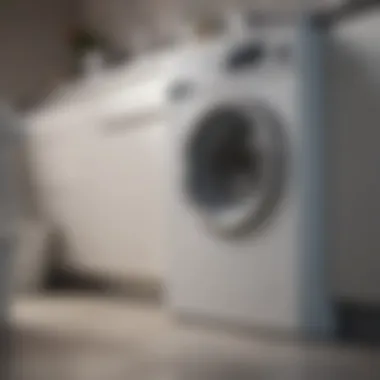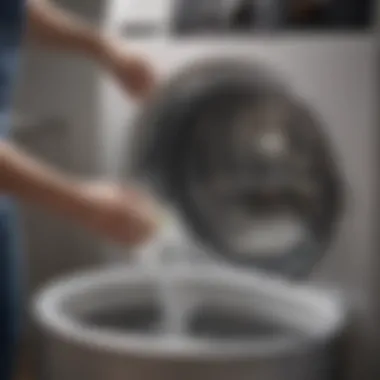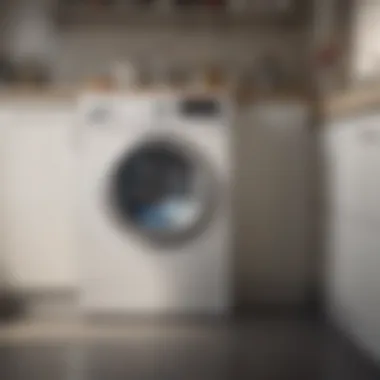Cleaning Your Washing Machine with Vinegar: Expert Guide


Intro
Cleaning a washing machine is a task that often gets overlooked. Homeowners may not realize that mold, soap scum, and mineral deposits can build up inside their machines. Using vinegar is a practical and eco-friendly solution to maintain cleanliness and performance without the need for harsh chemicals.
This guide will discuss the approach to cleaning your washing machine effectively with vinegar. We will explore the benefits it offers and provide comprehensive steps to execute this task if you are looking to improve hygiene.
Understanding Vinegar's Cleaning Properties
Vinegar is largely composed of acetic acid, which enables it to dissolve mineral deposits, sanitizes surfaces, and removes odors.
- Deodorizing Moves: The ability of vinegar to neutralize bad smells contributes significantly to fresher laundry.
- Fill Model: Vinegar can tackle gunk that regular detergent fail to address.
Benefits of Using Vinegar
Cleaning your washing machine with vinegar brings many advantages. Here are some concrete benefits:
- An eco-friendly cleaning alternative to ready-made solutions.
- Inexpensive and easily obtainable.
- Reduces the need for mechanical repairs caused by neglected maintenance.
Step-by-Step Process for Cleaning
Cleaning your washing machine with vinegar is simple. The following outlines a thorough method:
- Gather Your Supplies: You will need white vinegar, a microfiber cloth, and baking soda if there is heavy buildup.
- Empty the Machine: Ensure the washing machine is completely empty.
- Vinegar Fill: Pour two cups of vinegar directly into the drum. Use the detergent dispenser for an additional cup if needed.
- Run a Hot Cycle: Start a cleaning cycle on the highest temperature.
- Add Baking Soda (Optional): For extra cleaning, add half a cup of baking soda to the drum after the vinegar cycle.
- Wipe Down: After the cycle ends, take a microfiber cloth to clean the door and exterior surfaces.
Additional Maintenance Recommendations
For optimal performance, consider running a cleaning cycle once a month. Additionally,you should:
- Leave the Door Open: This allows air circulation and prevents mold development.
- Check and Clean Seals: Regular inspection of the rubber gaskets can prevent gunk buildup.
Remember: Proper maintenance enhances longevity and performance, minimizing costs associated with irreversible damage.
By adopting these practices, you maintain your washing machine efficiently and prolong its lifespan while safeguarding your health.
Prelims to Washing Machine Maintenance
Maintaining a washing machine is not a trivial task. Proper upkeep ensures efficiency and hygiene. Given that a washing machine is often a focal point in any home’s laundry routine, neglecting it could lead to significant issues over time. This coverage in this article explores the relevance of keeping your washing machine clean. Key elements like regular cleaning, health benefits, and maintenance considerations align well with the usage of natural cleaning solutions, particularly vinegar.
The Importance of Regular Cleaning
Often, the washing machine is overlooked. Yet, regular cleaning plays a vital role in the longevity of the appliance. Grime, residues, and build-up can accumulate within the machine. This situation can lead to unpleasant odors and malfunction. Cleaning forces out potential causes of these problems. Moreover, it enhances the overall performance of the machine, providing fresher, cleaner laundry. by committing to a cleaning regimen, homeowners can significantly reduce the risks of costly repairs over time. Added benefits include a more enjoyable laundry experience that avoids transferring unpleasant scents to clothing.


Common Issues Caused by Neglect
Ignoring the maintenance of a washing machine can invite several rice conditions:
- Mold Growth: The damp interior environment fosters mold and mildew development. It presents not just a smell but health concerns as well.
- Reduced Efficiency: Dirt and wax build-up can lead to increased cycle times and energy usage, elevating utility bills unnecessarily.
- Mechanical Failure: Foreign rocks or appliance debris can obstruct drainage, potentially resulting in costly mechanical issues.
- Stalin Order Issues: Clothes may not clean well and can emerge with lingering odors, thereby questioning the very purpose of the appliance.
In summary, comprehensively maintaining a washing machine is undoubtely crucial. Taking time to address the common issues mitigated by regular cleaning should form an integral part of an effective laundry routine.
Understanding Vinegar as a Cleaning Agent
Vinegar is often overlooked when it comes to topics in cleaning. However, using vinegar for cleaning washing machines can be quite effective. Understanding its properties helps in seeing why it is a preferred choice. Homeowners looking to maintain their appliances are continually searching for methods that well reduce buildup and odors. Knowing the mechanism behind vinegar is essential for a proper cleaning process.
The Chemical Composition of Vinegar
Vinegar comprises mainly of acetic acid and water. The standard concentration of acetic acid in household vinegar is roughly 5%. This combination allows vinegar to act as an acidic agent, making it potent when addressing mineral deposits, soap scum, and mildew. The acidic nature breaks down residues while being safe for many surfaces found in appliances. The properties of vinegar enable it to dissolve limescale and reduce serious bacterial issues that can arise in washing machines. Randomly, some types of liqueurs use ingredient made that creates forms of acetic acid, reaching bottling.
Benefits of Using Vinegar for Cleaning
Vinegar exerts many advantages as a cleaning agent:
- Eco-friendly: Unlike some chemical cleaners, vinegar does not harm the environment.
- Cost-effective: A simple bottle of vinegar is usually less expensive than branded cleaning products.
- Anti-mold properties: It can effectively control mold and mildew, reducing unpleasant odors.
- Deodorizing qualities: Vinegar absorbs odors rather than just masking them.
- Stain removal: It helps in breaking down and removing stains caused by minerals in water.
Using it regularly in your washing machine can lead to a fresher, more hygienic appliance, thus promoting the longevity of this necessary tool.
Vinegar's versatility and safety make it an ideal choice for effective cleaning without harsh chemicals, supporting the health of both your appliance and the environment.
Preparing Your Washing Machine for Cleaning
Cleaning your washing machine is an essential task that ensures your appliance operates efficiently and extends its lifespan. Preparing the machine adequately before the cleaning process can make a noticeable difference not just in cleanliness, but also in performance. If you skip this vital step, effectiveness can diminish, leading to stubborn stains and unpleasant odors persisting in your machine.
Addressing preparation involves a few key elements. Firstly, you must identify and gather the right supplies. This ensures that you have everything you need close at hand for a smooth cleaning process. Secondly, it is important to take specific safety precautions to protect both yourself and the machine during the cleaning process. Knowing what to do before, during, and after performing the cleaning helps prevent any accidents and maximizes the cleaning effect. Preparing layout and approach can transform the experience into a less daunting one.
Gathering the Necessary Supplies
To effectively clean your washing machine with vinegar, it is crucial to ensure you have the right supplies readily available. The primary item you'll need is natural white vinegar, which acts as a potent cleaning agent due to its high acetic acid content. Apart from vineger, there are few other things that will enhance the cleaning process:
- Baking soda: Using it in conjunction with vinegar can provide a deeper clean, eliminating stray odors and tough stains.
- Microfiber cloth: This cloth is ideal for wiping surfaces without scratching or damaging them.
- Measuring cup: This can help in measuring the correct amount of vinegar and baking soda.
Optional supplies like a spray bottle might be useful for easier application, though primarily not necessary. Ensuring you have these items prepared contributes to an efficient orchestrated cleaning experience, rather than a frantic last-minute search through cluttered cabinets.
Safety Precautions to Take
When cleaning your washing machine, taking some basic safety precautions will protect you and enhance the success of your cleaning efforts. Here are few recommendations:


- Unplug the machine: Always disconnect the washing machine from the power source before beginning any cleaning. This protects you from electrical shock and adheres to best practices regarding safey.
- Wear gloves: Although vinegar is a natural product, it can irritate skin after prolonged exposure. Using gloves can prevent irritation.
- Ensure proper ventilation: Open nearby windows or switch on fans, especially if you use other cleaners in conjunction with vinegar. Adequate airflow reduces possible irritation.
- Avoid mixing cleaners: Never mix vinegar with bleach or ammonia-based cleaners, as this can create toxic gases. Stick to vinegar or combining it with baking soda, safe mix designed for cleaning.
Following these simple guidelines ensures you can focus on maintaining cleanliness without the worry of hazards or unplanned complications. Plan out your cleaning strategy wisely to ensure your washing machine remains in good condition.
Step-by-Step Guide to Cleaning with Vinegar
Cleaning your washing machine is a fundamental aspect of home upkeep that often goes undervalued. With increasing reliance on this appliance, ensuring its cleanliness promotes both efficiency and longevity. The step-by-step guide to cleaning your washing machine with vinegar presents straightforward instructions. This method offers a practical approach that eschews harsh chemicals while maximizing results. Here, each step is designed to seamlessly integrate vinegar’s cleaning capabilities into your washing machine maintenance routine.
Emptying the Washing Machine
Before beginning the cleaning process, it is crucial to empty your washing machine entirely. Check that there are no clothes or items inside the drum. Leaving debris can impede the cleaning cycle and lead to residue buildup on fabrics. Remove all artciles and inspect the drum, ensuring nothing remains. This preparation step sets the foundation for effective cleaning.
Adding Vinegar to the Drum
The next step involves adding vinegar to the machine. Pour approximately two cups of white vinegar directly into the washing drum. White vinegar is widely regarded for its natural acidity, which effectively breaks down unwanted substances. When using vinegar, choose a high-acidity grade to maximize its thorough cleaning properties. It is recommended to avoid low-quality vinegars for the best outcome. This simple step will enhance the cleaning cycle’s effectiveness.
Running a Cleaning Cycle
After vinegar is added, select a cleaning cycle on your washing machine. Most modern washing machines have a specific setting designed for maintenance. This cycle typically involves using hot water, which benefits the vinegar’s cleaning process. To reinforce efficacy, you may consider running the first cycle without clothes. This initial wash effectively helps eradicate grime and mildew that build up over time. Following this instruction ensures that your machine is effectively cleaned from the inside out.
Wiping Down Parts After the Cycle
Once the cleaning cycle completes, take a moment to wipe down interior components. Pay particular attention to the rubber seals and dispenser trays. Use a damp cloth to remove leftover residue and dampness. This practice helps eliminate any lingering mildew or detergent buildup. Remember to also clean the exterior controls and door for a comprehensive touch. This attention to detail will keep your washing machine looking fresh while ensuring optimal performance.
Regularly cleaning your washing machine can significantly contribute to its efficiency and lifespan.
Additional Cleaning Tips
Cleaning your washing machine is not a one-time event but an ongoing process. These additional cleaning tips can enhance the effectiveness of your maintenance routine and increase the longevity of your appliance. By implementing these strategies, you not only improve the machine's performance but also maintain a mold-free and fresh-smelling environment in your laundry. Regular attention to your washing machine prevents the build-up of grime and odors that can affect your laundry's cleanliness.
Using Baking Soda for Enhanced Cleaning
Baking soda is a versatile cleaning agent that can work effectively in conjunction with vinegar. When mixed, these ingredients produce a gentle reaction that efficiently lifts stains and neutralizes odors. To use this combination, simply add half a cup of baking soda to the washing machine drum after adding the vinegar. The outcome is a thorough cleaning effect, addressing subtle odors and stubborn residues that vinegar alone may not eliminate.
Consider these benefits:
- Combats odor and residue effectively
- Non-toxic and safe for all appliance types
- Cost-effective cleaning solution
When performing the cleaning cycle, always set it to a hot water wash if possible. This combination not only sanitizes but removes any stubborn dirt that may have accumulated over time. Keep in mind, do not mix them directly together beforehand, as it may cause the solution to bubble excessively and create a mess.
How Often to Clean Your Washing Machine
The frequency of cleaning your washing machine can rely on usage, but a general guideline is to clean it once every month if you use it regularly. For those who wash a large volume of laundry or use high-efficiency washing machines, consider increasing the frequency to every three weeks.


Factors to consider:
- Type of washing machine
- Frequency of use
- Water quality (hard water can lead to build-up)
If you notice any musty odors or visible residue inside, it's time for a cleaning session, regardless of your set schedule. A routine maintenance cleaning ensures optimal function of the machine and prevents long-term damage like clogged filters and harmful bacteria growth. Keeping a consistent cleaning schedule will lead to cleaner laundry and a machine that lasts much longer.
Regular maintenance promotes hygiene and efficiency in laundry practices.
Addressing Common Concerns and Myths
Cleaning your washing machine regularly is important, but there are several concerns that can arise when it comes to using vinegar as a cleaning agent. By addressing these concerns, this guide offers useful insight into ensuring that your appliance remains in good condition. Clarifying myths surrounding this cleaning solution assures homeowners of its effectiveness without risking their washer's integrity.
Is Vinegar Safe for All Washing Machines?
Many homeowners may wonder if vinegar is safe to use with different types of washing machines, particularly those equipped with sensitive parts or unique features. Generally, vinegar is safe for most top-loading and front-loading machines, thanks to its natural acidic properties, which help dissolve mineral buildup and eliminate odors.
However, some manufacturers advise against using vinegar in their machines. This is particularly true for models with rubber seals or gaskets that can be degraded over time by strong acids. It is essential to consult the owner’s manual for guidelines specific to your machine. Here are a few considerations:
- Manufacturer’s Recommendations: Check if your appliance’s manufacturer allows vinegar as a cleaning agent.
- Model Variations: Some machines may come with features that are not compatible with vinegar. Always do your research first.
- Previous Usage: If vinegar has been used regularly, monitor for any wearing in seals over time.
Use of vinegar in the right circumstances can yield impressive results, but just ensure to keep your washing machine's unique requirements in mind.
Potential Risks of Using Vinegar
Although vinegar can be an effective cleaner for many uses, it is not without its risks. Understanding these risks ensures that the cleanup process will not damage your washing machine.
- Rubber Parts Damage: Over time, continuous exposure to acidic solutions like vinegar can lead to degradation of seals and gaskets.
- Corrosion Concerns: If misused, vinegar may corrode some metal components within the appliance. This can disrupt functionality and lead to increased repair costs.
- Acidic Balance: Frequent use could disturb the banana or bacterial patterns that membranes in some machine types rely on, impacting overall machine efficiency.
Always prioritize your machine's safety—when in doubt, seek expert advice.
The End
Cleaning your washing machine properly is crucial for the longevity and efficiency of the appliance. Vinegar serves as an accessible and effective cleaning agent. Its acidity can break down mineral deposits, odors, and even mildew that accumulate inside the drum. This method not only helps in maintaining the original functionality of the machine but also improves the overall hygiene of your laundry practices.
Summarizing the Benefits of Vinegar Cleaning
Using vinegar for cleaning your washing machine offers several key benefits:
- Cost-Effective: Vinegar is inexpensive compared to commercial cleaning solutions.
- Natural Agent: It poses less risk to your health and the environment.
- Versatile: Suitable for different washing machines, vinegar adapts to various needs of machine care.
- Effective Odor Control: The acidity effectively neutralizes unpleasant scents.
Many users find it directs eliminatoin of junk muddy buildup and mineral deposits without requiring scrubbing effort. The benefits are clear, removing the complexity often found in using harsher chemicals.
Encouraging Regular Maintenance
To maintain the cleanliness and function of your washing machine, regular maintenance is essential. Vinegar cleaning should become part of your cleaning routine:
- Frequency of Cleaning: Aim to clean your machine with vinegar at least once every month or two.
- Routine Checks: Look for leaks or malfunctions periodically. Addressing small concerns early can prevent larger problems.
- Additional Cleaning Practices: Consider rotating the use of baking soda for extended cleaning. Both methods complement each other, enhancing the machine's life span.
Overall, fostering might facilitate a productive maintenance schedule that ensures effective laundering for years. Incorporating vinegar cleaning into your routine improves not just the washing machine but its functionality in your household.



